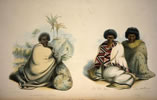‘He iwi tahi tātou’ (often translated as ‘We are one people’), announced British representative William Hobson at the signing of the Treaty of Waitangi in 1840.1 Since then New Zealand has frequently claimed that its race relations are the finest in the world. However racism, the belief that one group of people is superior to another on the basis of characteristics they did not choose, has also been present from its colonial beginnings. New Zealand has always been an isolated country, with relatively little ethnic diversity for much of its history, and this has encouraged intolerance of ethnic differences.
Early colonial attitudes to race
In the mid-19th century, as large numbers of European migrants began arriving, European attitudes towards race and the domination of indigenous peoples were becoming more liberal. The worldwide movement to abolish slavery was near the peak of its influence. The damaging effects of colonisation on the indigenous populations in places such as Australia and French Polynesia disturbed many Europeans. Some migrants to New Zealand regarded Māori as superior to other colonised peoples.
These attitudes contributed to the climate of feeling that resulted in the Treaty of Waitangi, which offered Māori the rights of British citizens. This was ‘the fairest treaty ever made by Europeans with a native race’, according to a textbook used by all New Zealand schoolchildren in the 1920s and 1930s.2 The New Zealand Constitution Act 1852, based partly on the treaty, gave Māori males the right to vote on the same basis as European males.
Upholding the Treaty of Waitangi
However, very soon after the signing of the Treaty there were indications that many of its promises were not being kept. Only a small number of Māori men were actually able to exercise their right to vote since, like Pākehā voters, they needed to own or rent land (Māori land was traditionally communally owned).
In the late 1840s the Waikato chief Te Wherowhero wrote to Queen Victoria protesting at breaches of the Treaty. In 1884 and 1914 two of his descendants led delegations to Britain seeking to have the Treaty of Waitangi recognised. Both were unsuccessful.
A philo-Māori writes
Sarah Selwyn, along with her husband Bishop G. A. Selwyn, was appalled at the government’s 1860 decision to enforce the purchase of land in Taranaki. She wrote, ‘It is strange how coolly even right-thinking people consign a whole people to destruction as something inevitable, as no blot upon the so-called superior race … assuming the natives are rebels before they have done one single thing to prove themselves to be so.’3
Philo-Māori
The term ‘philo-Māori’ (or ‘Māori-lover’) was used, usually in a hostile sense, by mid-19th-century journalists and politicians to refer to those Pākehā who were seen as supporting Māori and therefore obstructing the interests of settlers. Philo-Māori were usually familiar with the Māori language and had strong connections with the government in Britain. Many were associated with the Anglican Church. The missionary Octavius Hadfield, for example, wrote a series of pamphlets criticising the government’s policies in Taranaki. When these were published in London in the 1860s, many settlers regarded his actions as bordering on treason.
A colonial official, Walter Mantell, had helped to deprive South Island Māori of nearly all their land, and later bitterly regretted what he came to regard as an unjust process. He became a minister in several governments but resigned each time because the government failed to honour its promises to Ngāi Tahu.
In 1883 George Rusden, an Australian civil servant and historian, published a History of New Zealand, which set out a long list of violations of the Treaty of Waitangi.

